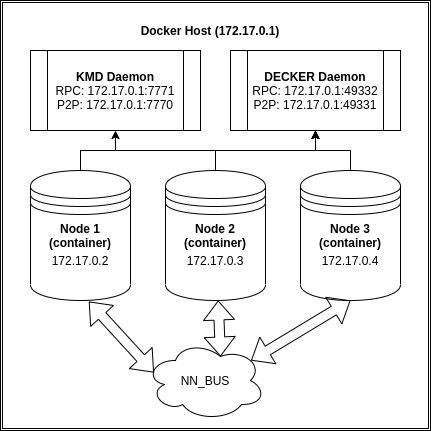It's an automated dPoW notarizations testnet environment.
We have a PC with 2 daemons running (KMD, DECKER), for example. Also we have a 3 docker containers with separate iguana / notary node in each. Using iptables rules we fool iguana, forcing it to think that it is connected to the daemon RPC at 127.0.0.1, but all iguanas are actually connected to the same coin daemon installed on docker host. So, it's just a transparent port forwarding of 127.0.0.1:RPC_PORT -> 172.17.0.1:RPC_PORT. As a result we have just one daemon per coin utilized by as many notaries as we want, that perfectly fits in dev purposes, bcz we don't need separate physical hosts for each notary.
Install docker (guide):
sudo apt update
sudo apt install apt-transport-https ca-certificates curl gnupg2 software-properties-common
curl -fsSL https://download.docker.com/linux/debian/gpg | sudo apt-key add -
sudo add-apt-repository "deb [arch=amd64] https://download.docker.com/linux/debian $(lsb_release -cs) stable"
sudo apt update
sudo apt-cache policy docker-ce
sudo apt install docker-ce
sudo systemctl status docker
Clone iguana-docker repo:
git clone https://github.com/DeckerSU/iguana-docker
cd iguana-docker
Generate notaries.json file:
prepare-notaries.sh > notaries.json
Will look like:
[
{
"id": "1",
"passphrase": "fa2511419ea73899a2be34dbd3f172bd173d4d045d1163d4e370305564ea73ce",
"address": "RHSKEzvQD9o3xScf7g64WEpRfGox6zpMYM",
"wif": "UsFnnktnXcvxwGaGsvWfHhD7Ej444YVibyYCJqrRp2jDzWLA2fTo",
"pubkey": "02bb7ab714d858f5da75f93fdb0ab93822f142054262a4425205bb70efe7225394"
},
...
Parse notaries.json and generate other files:
parse_notaries.py notaries.json
The following files will be generated:
docker_test_elected- elected file for iguana testnetimport_privkeys- file with privkeys in convenient daemon import formatm_notary_docker_test- iguana startup file (will be placed inside a docker container on next step)start_containers- script with start_containers instructions
Build docker image:
sudo docker build -t iguana-test .
By default testnet will be configured with all mainnet assetchains enabled, that means that
RPC requests to any mainnet ACs from inside of the docker container will be forwarded to
docker host. An additional special test assetchain DECKER will be configured to dPoW in KMD
by default.
Params of DECKER AC is following:
-ac_name=DECKER -ac_supply=777777 -ac_reward=100000000
Start komodod on docker host with the args above and after it creates the config file in
~/.komodo/DECKER/DECKER.conf - stop it and add following lines;
rpcbind=172.17.0.1
rpcallowip=172.17.0.1/16
Where 172.17.0.1/16 is the default docker bridge subnet. You can get docker subnets via
sudo docker network ls, and inspect needed subnet with sudo docker network inspect bridge,
where bridge here is a subnet name.
You'll also need to change RPC credentials in the
~/.komodo/DECKER/DECKER.conf to the following:
rpcuser=rpcuser
rpcpassword=bitcoin123
This is needed bcz iguana in docker container is those credentials by default for ANY (!) deamon,
if not otherwise specified by variables DEFAULT_RPC_USERNAME and DEFAULT_RPC_PASSWORD via passing
environment variables to container, during start.
Only DECKER AC is active to dPoW by default. If you want to add any other chains in
m_notary_docker_test - feel free to add them, but you'll need to properly set-up rpcbind,
rpcallowip, rpcuser and rpcpassword in their .conf file. Same applies and to KMD
itself (i.e. you must change these variables in komodo.conf).
Start KMD and DECKER assetchains on docker host:
~/komodo/src/komodod -ac_name=DECKER -ac_supply=777777 -ac_reward=100000000 &
~/komodo/src/komodod -opretmintxfee=0.004 -minrelaytxfee=0.000035 &
Import privkeys to each daemon, using import_privkeys file contents as a helper.
Send the funds to the notaries addresses.
Launch containers automatically via:
source start_containers
To start one of containers in interactive mode:
sudo docker run --name iguana_<X> --privileged --network=bridge -it --rm -e PUBKEY="<PUBKEY>" -e PASSPHRASE="<PASSPHRASE>" iguana-test bash
where X is notary, and PUBKEY and PASSPHRASE are params of selected node from notaries.json. In case of starting the container manually in
interactive mode, to start dPoW use the following:
cd $HOME/dPoW/iguana
./m_notary_docker_test
Don't forget to attach to each container and do initial splitfunds:
curl -s --url "http://127.0.0.1:7779" --data '{"coin":"KMD","agent":"iguana","method":"splitfunds","satoshis":"10000","sendflag":1,"duplicates":"50"}'
curl -s --url "http://127.0.0.1:7779" --data '{"coin":"DECKER","agent":"iguana","method":"splitfunds","satoshis":"10000","sendflag":1,"duplicates":"50"}'
To connect to the container console use sudo docker exec -it iguana_X bash. To quit (detach console) and leave the container working press
Ctrl-P followed by Ctrl-Q inside docker interactive console.
To watch iguana log from specific container you can use sudo docker exec -it iguana_3 tail -f /root/dPoW/iguana/iguana.log.
Attach to the needed docker container:
sudo docker attach iguana_1
Or launch interactive shell in selected container:
sudo docker exec -it iguana_1 bash
Then, inside a container run:
# KMD example
curl --trace-time -v --user rpcuser:bitcoin123 --data-binary '{"jsonrpc": "1.0", "id":"curltest", "method": "getinfo", "params": [] }' -H 'content-type: text/plain;' http://127.0.0.1:7771
# DECKER example
curl --trace-time -v --user rpcuser:bitcoin123 --data-binary '{"jsonrpc": "1.0", "id":"curltest", "method": "getinfo", "params": [] }' -H 'content-type: text/plain;' http://127.0.0.1:49332
# KMD example
# check that ismine of your address is true
curl --trace-time -v --user rpcuser:bitcoin123 --data-binary '{"jsonrpc": "1.0", "id":"curltest", "method": "validateaddress", "params": ["RHSKEzvQD9o3xScf7g64WEpRfGox6zpMYM"] }' -H 'content-type: text/plain;' http://127.0.0.1:7771 | jq .
# listunspent
curl --trace-time -v --user rpcuser:bitcoin123 --data-binary '{"jsonrpc": "1.0", "id":"curltest", "method": "listunspent", "params": [1, 99999999, ["RHSKEzvQD9o3xScf7g64WEpRfGox6zpMYM"]] }' -H 'content-type: text/plain;' http://127.0.0.1:7771 | jq .
sudo docker stop $(sudo docker ps -q -a)
sudo docker rm $(sudo docker ps -q -a)
sudo docker ps -a
